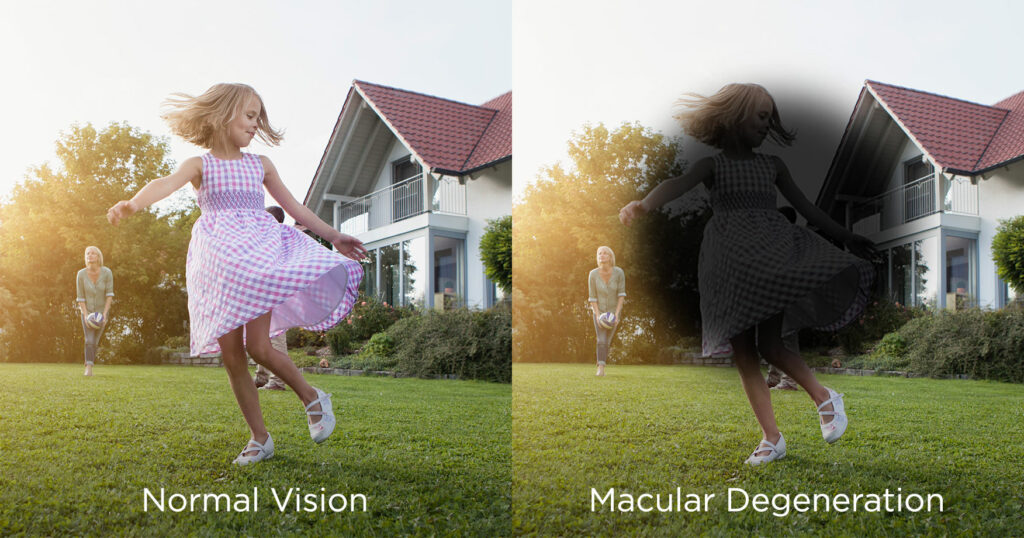
Macular degeneration, often called age-related macular degeneration (AMD), is an eye disorder associated with aging and results in damaging sharp and central vision. Central vision is needed for seeing objects clearly and for common daily tasks such as reading and driving. AMD affects the macula, the central part the retina that allows the eye to see fine details. There are two forms of AMD—wet and dry.
Wet AMD is when abnormal blood vessel behind the retina start to grow under the macula, ultimately leading to blood and fluid leakage. Bleeding, leaking, and scarring from these blood vessels cause damage and lea to rapid central vision loss. An early symptom of wet AMD is that straight lines appear wavy.
Dry AMD is when the macula thins overtime as part of aging process, gradually blurring central vision. The dry form is more common and accounts for 70–90% of cases of AMD and it progresses more slowly than the wet form. Over time, as less of the macula functions, central vision is gradually lost in the affected eye. Dry AMD generally affects both eyes. One of the most common early signs of dry AMD is drusen.
Drusen are tiny yellow or white deposits under the retina. They often are found in people aged 60 years and older. The presence of small drusen is normal and does not cause vision loss. However, the presence of large and more numerous drusen raises the risk of developing advanced dry AMD or wet AMD.
It is estimated that 1.8 million Americans aged 40 years and older are affected by AMD and an additional 7.3 million with large drusen are at substantial risk of developing AMD. AMD is the leading cause of permanent impairment of reading and fine or close-up vision among people aged 65 years and older.
AMD Symptoms
Macular degeneration symptoms usually develop gradually and without pain. They may include:
Visual distortions, such as straight lines seeming bent
Reduced central vision in one or both eyes
The need for brighter light when reading or doing close work
Increased difficulty adapting to low light levels, such as when entering a dimly lit restaurant
Increased blurriness of printed words
Decreased intensity or brightness of colors
Difficulty recognizing faces
Causes of AMD
The specific factors that cause macular degeneration are not conclusively known. The causes are complex, but include both heredity and environment. Scientists are working to understand what causes the cells of the macula to deteriorate, seeking a macular degeneration treatment breakthrough.
The condition develops as the eye ages. Dry macular degeneration affects the macula — an area of the retina that’s responsible for clear vision in your direct line of sight. Over time tissue in your macula may thin and break down.
Preventing AMD
It’s important to have routine eye exams to identify early signs of macular degeneration. The following measures may help reduce your risk of developing dry macular degeneration:
Manage your other medical conditions. For example, if you have cardiovascular disease or high blood pressure, take your medication and follow your doctor’s instructions for controlling the condition.
Don’t smoke. Smokers are more likely to develop macular degeneration than are nonsmokers. Ask your doctor for help to stop smoking.
Maintain a healthy weight and exercise regularly. If you need to lose weight, reduce the number of calories you eat and increase the amount of exercise you get each day.
Choose a diet rich in fruits and vegetables. Choose a healthy diet that’s full of a variety of fruits and vegetables. These foods contain antioxidant vitamins that reduce your risk of developing macular degeneration.
Include fish in your diet. Omega-3 fatty acids, which are found in fish, may reduce the risk of macular degeneration. Nuts, such as walnuts, also contain omega-3 fatty acids.
AMD Treatment
If you receive an AMD diagnosis, it’s not the end of the world. Like other eye conditions, it’s always better to diagnose and treat AMD at the earliest stage possible.
There is no known cure for Macular Degeneration at the moment, but there are treatments that are believed to slow its progression. For dry AMD, doctors generally suggest lifestyle changes such as increased exercise and a healthy diet. Research suggests that a diet high in antioxidants helps support the macular cells and slow the progression of macular degeneration. However, a specific nutritional formulation called the AREDS2 formula has been proven to slow the progression of AMD and is currently recommended for patients with dry AMD.
For wet AMD, injectable Anti-VEGF medications have been developed that stop the progression of the disease. VEGF stands for vascular endothelial growth factor. These slow the growth and stop the leakage and bleeding from the abnormal blood vessels growing beneath the macula. Anti-VEGF medications usually stabilize vision and in many patients can cause visual improvement.
If you are concerned that you may have macular degeneration or would like a deeper explanation about your macular degeneration treatment and management options, call us today or click here to request an appointment!

